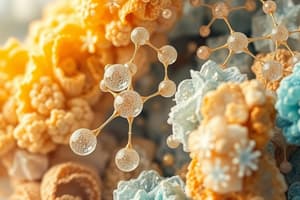Podcast
Questions and Answers
What is the recommended daily intake of phosphorus for adults?
What is the recommended daily intake of phosphorus for adults?
- 1200-1500mg/d
- 2000-2500mg/d
- 500-700mg/d
- 800-1000mg/d (correct)
Where is most of the body's phosphorus found?
Where is most of the body's phosphorus found?
- Liver
- Brain
- Muscles
- Bones and teeth (correct)
What is the normal range of plasma inorganic phosphorus?
What is the normal range of plasma inorganic phosphorus?
- 7-10 mg/dl
- 5-7 mg/dl
- 1-3 mg/dl
- 3-5 mg/dl (correct)
What is the main function of phosphorus in bone formation?
What is the main function of phosphorus in bone formation?
What is the recommended daily intake of iron for pregnant women?
What is the recommended daily intake of iron for pregnant women?
Where does the absorption of iron occur?
Where does the absorption of iron occur?
What is the mechanism of iron absorption?
What is the mechanism of iron absorption?
What is the Ca/P ratio in adults?
What is the Ca/P ratio in adults?
What is the minimum daily requirement of calcium for a child?
What is the minimum daily requirement of calcium for a child?
Which of the following is a source of calcium?
Which of the following is a source of calcium?
What is the classification of calcium based on its daily requirement?
What is the classification of calcium based on its daily requirement?
Which of the following minerals is classified as a Micromineral?
Which of the following minerals is classified as a Micromineral?
What is the primary function of zinc in the body?
What is the primary function of zinc in the body?
Which of the following minerals is required for the structure of bones?
Which of the following minerals is required for the structure of bones?
What is the recommended daily intake of calcium for pregnant women?
What is the recommended daily intake of calcium for pregnant women?
What percentage of calcium is present in body fluids and other tissues?
What percentage of calcium is present in body fluids and other tissues?
Which of the following is a characteristic of Microminerals?
Which of the following is a characteristic of Microminerals?
What is the primary function of diffusible calcium in the blood?
What is the primary function of diffusible calcium in the blood?
What is the primary cause of hypercalcemia?
What is the primary cause of hypercalcemia?
What is the result of acute calcium deficiency?
What is the result of acute calcium deficiency?
Where is the absorption of calcium primarily located?
Where is the absorption of calcium primarily located?
What is the primary excretion route of calcium?
What is the primary excretion route of calcium?
What is the role of calcium in muscle contraction?
What is the role of calcium in muscle contraction?
What is a source of phosphorus in the diet?
What is a source of phosphorus in the diet?
What is the ferric state of iron?
What is the ferric state of iron?
What is the function of reductase in the body?
What is the function of reductase in the body?
What is the total body iron of an adult male?
What is the total body iron of an adult male?
What is the function of myoglobin in the body?
What is the function of myoglobin in the body?
What is the cause of iron deficiency anemia?
What is the cause of iron deficiency anemia?
What is the characteristic of hemochromatosis?
What is the characteristic of hemochromatosis?
What is the source of zinc in the diet?
What is the source of zinc in the diet?
What is the role of zinc in the body?
What is the role of zinc in the body?
Flashcards are hidden until you start studying
Study Notes
Minerals
- Definition: Inorganic compounds needed as structural components and regulators of body processes.
- Classification:
- Macrominerals (Bulk elements): Required in amounts > 100 mg/day, including 7 elements: Calcium, Phosphorus, Sodium, Potassium, Chloride, Sulfur, and Magnesium.
- Microminerals (Trace elements): Required in amounts < 100 mg/day, including 11 elements: Iron, Iodine, Copper, Zinc, Fluoride, Manganese, Molybdenum, Selenium, Chromium, Cobalt, and Silicon.
Calcium
- Sources: Milk and milk products, leafy vegetables, and egg yolk.
- Daily requirements:
- Child: 1000 mg/d
- Adults: 800 mg/d
- Pregnant women: 1500 mg/d
- Absorption: Active process in the upper part of the small intestine, requiring calcium-binding protein.
- Distribution: 99% in bones and teeth, 1% in body fluids and other tissues.
- Plasma calcium: 9-11 mg/dl, present in 2 forms: Diffusible calcium (50% of total serum calcium) and Non-diffusible calcium.
- Functions:
- Calcification of bones and teeth
- Regulation of transmission of nerve impulses
- Regulation of contraction of muscles
- Blood clotting mechanism
- Cardiac conduction
- Acts as a second messenger for hormonal action
- Hypercalcemia and Hypocalcemia:
- Causes: Primary hyperparathyroidism, ectopic cells, excess intake of vitamin D or calcium, bone diseases
- Effects: Stone formation, calcification in different tissues
- Causes: Hypoparathyroidism, alkalosis, kidney diseases, vitamin D inhibition
- Effects: Tetany, Rickets, Osteomalacia
Phosphorus
- Sources: Milk and milk products, fish, meat, liver, kidney, and leafy vegetables.
- Daily requirements:
- Adults: 800-1000 mg/d
- Pregnant women: 1500-2000 mg/d
- Absorption: Active transport mechanism, affected by factors that affect calcium absorption.
- Distribution: 600 gm in skeleton (bones and teeth), 700 gm total body phosphorus.
- Plasma phosphorus: 3-5 mg/dl, present in 2 forms: Inorganic phosphate and Organic phosphate.
- Functions:
- Formation of bones
- Plasma buffers (phosphate buffers)
- Cellular components: Nucleic acids, Phospholipids, Phosphoproteins, Coenzymes, Second messengers
Iron
- Sources: Meat, liver, kidney, nuts, beans, and dates.
- Daily requirements:
- Adults: 10 mg/day
- Pregnant and lactating women: 30 mg/day
- Absorption and Transport: 10-20% of dietary iron absorbed in the duodenum and proximal jejunum, via Mucosal block theory.
- Iron Containing proteins:
- Hemoglobin: carries oxygen
- Myoglobin: stores oxygen
- Respiratory enzymes: use oxygen
- Cytochrome P450: detoxicates drugs and oxygen
- Other enzymes: catalase, peroxidase, and tryptophan oxygenase
- Clinical abnormalities:
- Iron deficiency anemia: causes, decreased intake, decreased absorption, increased loss, and increased requirements.
- Iron overload: causes, repeated blood transfusion, intravenous administration of iron, and hemochromatosis.
Zinc
- Sources: Meat, liver, eggs, seafood, milk, and whole grain cereals.
- Absorption: Occurs mainly in small intestine.
- Functions:
- Essential for growth and reproduction
- Plays a role in tissue repair and wound healing
- Forms a complex with insulin in pancreas, helping storage and release of insulin.
Studying That Suits You
Use AI to generate personalized quizzes and flashcards to suit your learning preferences.





